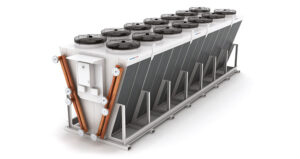
Introduction:
When it comes to cooling systems, dry coolers are gaining popularity as a reliable and sustainable alternative to traditional cooling methods. Dry coolers, also known as air-cooled heat exchangers, offer numerous advantages in various applications. In this blog post, we will explore the functionality, advantages, and applications of dry coolers, shedding light on their efficiency and environmental benefits.
- How do Dry Coolers Work?
Dry coolers operate on the principle of transferring heat from a hot fluid to the ambient air without the use of water. They consist of a finned-tube heat exchanger and an air-moving device, such as a fan or fans. The hot fluid flows through the tubes, while the ambient air is forced over the finned surface, enhancing heat transfer. This process cools the fluid, allowing it to be recycled or discharged at a lower temperature.
- Advantages of Dry Coolers:
a. Water Conservation: One of the significant advantages of dry coolers is their ability to operate without water consumption. Unlike cooling towers that rely on evaporative cooling and consume significant amounts of water, dry coolers eliminate the need for water supply, treatment, and associated costs. This makes them an environmentally friendly choice and helps conserve water resources.
b. Energy Efficiency: Dry coolers offer energy-efficient cooling solutions. By utilizing natural convection and forced air circulation, they eliminate the need for additional energy-consuming equipment like pumps or compressors. This results in reduced energy consumption, lower operating costs, and a smaller carbon footprint.
c. Space Optimization: Dry coolers have a compact design, making them suitable for applications where space is limited. They can be installed vertically, horizontally, or stacked, providing flexibility in space utilization. This advantage is particularly valuable in urban areas or installations where available space is a constraint.
d. Reliability and Versatility: Dry coolers offer reliable cooling performance in various industries and applications. They can efficiently cool different fluids, including water, glycol, oils, and refrigerants. This versatility makes them suitable for diverse applications, such as industrial processes, data centers, HVAC systems, and power plants.
e. Low Maintenance: Compared to cooling towers, dry coolers require minimal maintenance. They do not have water-related scaling or fouling issues, reducing the need for regular cleaning and chemical treatments. This translates to lower maintenance costs and less downtime.
f. Weather Independence: Dry coolers are not affected by changes in ambient temperature or humidity. They can operate effectively in both hot and cold climates, providing consistent cooling performance year-round.
g. Noise Reduction: Dry coolers are typically quieter than cooling towers. They do not use fans or water spray systems, resulting in reduced noise levels. This makes them suitable for noise-sensitive environments, such as residential areas or facilities with strict noise regulations.
- Applications of Dry Coolers:
Dry coolers find applications in various industries, including:
a. Industrial Processes: Dry coolers are widely used in industrial processes, such as chemical manufacturing, oil refining, and food processing. They provide efficient and reliable cooling for critical operations.
b. Data Centers: Dry coolers are employed in data centers to dissipate the heat generated by computer servers. They help maintain optimal temperatures for efficient and uninterrupted operation.
c. HVAC Systems: Dry coolers are utilized in HVAC systems for cooling buildings, hotels, hospitals, and commercial spaces. They provide efficient cooling while eliminating the need for water consumption and associated water treatment costs.
d. Power Generation: Dry coolers play a vital role in power plants, where they provide cooling for turbine condensers, generators, and transformer cooling systems.
Conclusion:
Dry coolers offer a host of advantages, including water conservation, energy efficiency, space optimization.
